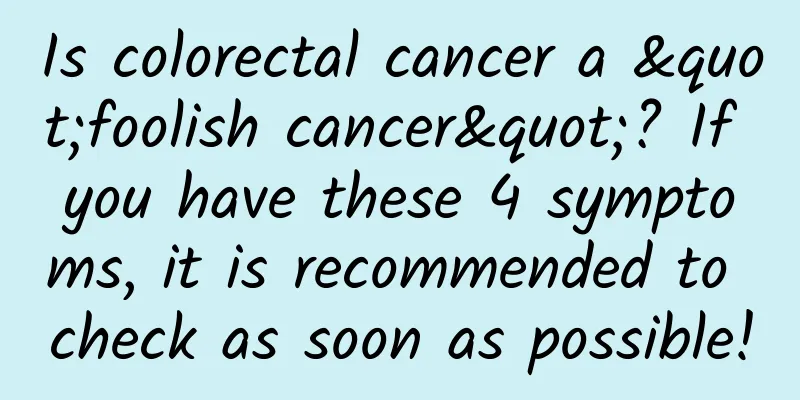Is colorectal cancer a "foolish cancer"? If you have these 4 symptoms, it is recommended to check as soon as possible!

|
In the past six months, Ms. Fang has suffered from recurrent abdominal pain . She thought it was due to her old age and poor stomach, so she didn't take it seriously. Recently, Ms. Fang found that her abdominal pain had worsened, and she had diarrhea and intermittent black stools . She went to the local hospital for a blood test and found that the serum carcinoembryonic antigen concentration was elevated to 6.67 ng/mL. This result made Ms. Fang and her family nervous, so they went to the provincial hospital for treatment. During the consultation, the outpatient doctor's physical examination showed tenderness in the lower abdomen but no rebound pain; several peanut-sized lymph nodes could be felt in the groin. Based on the medical history and examination results, the doctor initially determined that it might be a gastrointestinal malignancy and recommended hospitalization for further examination, but Ms. Fang refused hospitalization and requested a colonoscopy in the outpatient clinic first. Colonoscopy revealed a rectal tumor, and the pathological biopsy diagnosed it as high-grade intraepithelial neoplasia. The doctor then admitted the patient to the hospital for investigation of the nature of the rectal mass: possible precancerous lesions. After admission to the hospital, the doctor once again explained the patient's condition in detail to Ms. Fang and her family. Although the colonoscopy pathology report showed precancerous lesions, considering that colonoscopy biopsy has certain limitations and cannot truly reflect the tumor condition, and that high-grade intraepithelial neoplasia and invasive cancer may coexist, in order to avoid missed diagnosis, it is recommended to complete enhanced chest and abdominal CT examinations. Ms. Fang and her family accepted the doctor's advice. The results of the enhanced CT scan of the chest and abdomen showed: rectal mass, considering rectal cancer, and the possibility of involving the posterior wall of the uterus. Therefore, Ms. Fang's final diagnosis was revised to: invasive rectal cancer with partial high-grade intraepithelial neoplasia. After two weeks of hospitalization, the surgeon performed laparoscopic radical resection of rectal cancer. Four weeks after the operation, Ms. Fang received adjuvant chemotherapy with oxaliplatin injection and capecitabine tablets. After that, her abdominal pain, black stools, diarrhea and other symptoms disappeared, her blood carcinoembryonic antigen concentration dropped to normal levels, and she was able to take care of herself completely. Her behavioral ability score (KPS score) could reach 80 points. Doctors remind that rectal cancer is a malignant tumor disease that occurs in the rectal mucosal epithelium and is the most common malignant tumor of the digestive tract. The most common clinical manifestation of rectal cancer is a change in bowel habits , mainly an increase in the frequency of bowel movements without obvious causes. Patients with lower-lying rectal cancer always have a feeling of incomplete bowel movements. Another common symptom is blood in the stool . The amount of bleeding is relatively small, but it occurs repeatedly and is often mistaken for hemorrhoidal bleeding, which delays the disease. Therefore, if there is a change in bowel habits or blood in the stool, you should go to the hospital in time for a colonoscopy to rule out the possibility of rectal cancer. 01 Colon cancer is actually a "foolish cancer" With the improvement of living standards, changes in people's diet structure, work, living habits and other factors have led to more and more gastrointestinal problems. The incidence of colorectal cancer has increased year by year and is showing a trend of becoming younger. Statistics show that one person dies from colon cancer every five minutes in China. The reason why the mortality rate of colorectal cancer is so high is mainly because many patients ignore the "alarm signals" of colorectal cancer in the early stages, mistaking colorectal cancer for hemorrhoids or simply thinking it is caused by improper diet, thus missing the best period for treatment. But in fact, colorectal cancer is the dumbest cancer, a "fool's cancer" because unlike latently developing cancers, the early stages of colorectal cancer have relatively easy-to-detect symptoms. If the patient can be discovered and treated in time in the early stages, it can be effectively controlled. Studies have found that more than 90% of colorectal cancers are caused by the malignant transformation of intestinal polyps . The whole process from polyps to cancer is very long, taking at least 5 to 10 years . If you can have a colonoscopy during this period, you can greatly reduce the risk of cancer. Moreover, the treatment effect of colorectal cancer is directly related to the early or late detection . The 5-year survival rate after resection of early colorectal cancer can reach 90%~95% , while the 5-year survival rate after surgery for late colorectal cancer is less than 20% . Therefore, early detection of colorectal cancer is very important. 02 These 4 symptoms may be signs of colon cancer 01 Blood in the stool Finding bright red blood in the stool is one of the most common early symptoms of colorectal cancer . Blood in the stool is usually caused by the growth of tumors in the intestine, which causes damage to the intestinal mucosa. The surface of the stool is bloody and mucus, and even contains blood and pus. It should be noted that blood in the stool is not necessarily red . It may also appear in black, brown or other colors . Blood in the stool may also appear in some sticky stools. If colon cancer occurs in the rectum near the anus, bright red blood may be discharged from the stool. Reminder: Patients with early-stage colorectal cancer may experience bloody stools, which can be easily confused with hemorrhoidal bleeding, so they need to seek medical attention promptly to clarify the condition. 02 Changes in bowel habits and characteristics If there is a sudden change in bowel habits and characteristics, you should be alert to the occurrence of colon cancer. Patients with early-stage colorectal cancer may experience changes in bowel habits 3 to 6 months before the onset of the disease, such as defecating once a day to 2 to 3 times a day. People who were not constipated before may develop stubborn constipation, or tenesmus, alternating diarrhea and constipation, etc. Changes in stool characteristics may manifest as unformed stools, thin stools, thin stools, or stools with mucus, pus and blood. Some patients may also experience black stools . Laboratory tests after consultation will indicate a positive fecal occult blood test. 03 Abdominal pain and abdominal mass When touching the patient's abdomen, a hard, movable mass can be clearly felt , and the mass tends to gradually increase in size. This may be caused by the combination of the tumor and intestinal-related tissues. Moreover, the location of the abdominal mass may be related to the location of the cancer. It is generally hard in texture, varies in size, and may be painful when pressed. Patients with colorectal cancer may also experience symptoms of abdominal pain , which is often manifested as dull pain or dull pain . The specific location of the pain may be related to the location of the tumor. For example, right-sided colorectal cancer may cause abdominal pain on the right side , while left-sided colorectal cancer may cause abdominal pain on the left side, and rectal cancer may cause pain in the perineum. If colorectal cancer causes narrowing of the intestinal cavity, the abdominal pain may worsen. If intestinal cancer blocks the intestine and causes intestinal obstruction, it may manifest as paroxysmal abdominal cramps , and may be accompanied by symptoms such as no gas, no bowel movements, nausea and vomiting. 04 Alternating diarrhea and constipation Another very notable feature of colorectal cancer patients is diarrhea , and this diarrhea alternates with constipation . Patients with colorectal cancer often have a feeling of incomplete bowel movements, which leads to increased frequency of bowel movements , loose stools, and unformed stools. As the tumor in the intestine continues to grow, it may cause blockage of the intestinal cavity, making it difficult to excrete stool. If this continues for a long time, symptoms such as difficulty in defecation and dry and hard stools may occur . In addition, anemia and weight loss are also one of the early signs of colorectal cancer, especially in patients with right-sided colon cancer, where anemia is more obvious. If you have a family history of colorectal cancer or polyps , have a history of chronic intestinal disease before you are 40 years old , or suddenly have the above symptoms recently , you should see a doctor in time. 03 How to prevent colorectal cancer? Do these 4 things 1 Light diet Colorectal cancer is a lifestyle disease, which means that bad living habits are one of the root causes of the disease. Therefore, regulating diet in daily life is the top priority for colorectal cancer patients. A diet high in fat, protein and fiber is the most common cause of colon cancer. Therefore, the diet structure should be adjusted, and a light diet should be adopted. Care should be taken to avoid frying and other cooking methods as much as possible, and steaming, boiling and stewing should be the main methods. Usually, you can eat more crude fiber foods and fruits to promote intestinal peristalsis and intestinal emptying, reduce the direct stimulation of toxic substances on the intestinal wall, and significantly reduce the risk of colorectal cancer. Leafy vegetables such as celery, leeks, and cabbage contain more insoluble fiber, while fruits contain more soluble fiber. Soluble dietary fiber is digested and absorbed by the human body and enters the large intestine to be used by bifidobacteria, which promotes the proliferation of bifidobacteria . Bifidobacteria can decompose carcinogens such as nitrosamines , and can enhance the phagocytic ability of macrophages, thereby increasing the body's immune function and resistance to tumors. Therefore, we advocate "one bite of meat and four bites of vegetables". 2 Nutritional supplements The intestine acts as a "converter" of material metabolism, and normal human metabolism requires the assistance of B vitamins. Other studies have found that if the daily diet contains sufficient vitamin D, the incidence of colorectal cancer can be reduced by more than 50% compared to people who lack vitamin D intake. In daily diet, you should supplement carotene and other vitamins, such as vitamin A, vitamin C, vitamin E and vitamin B2, in appropriate amounts to reduce the risk of colon cancer . You can eat some peanuts, milk, mung beans, soybeans, red beans, fish, mushrooms, whole grains and seafood to supplement a variety of vitamins. 3 Quit smoking and limit alcohol consumption Studies have shown that alcohol intake is positively correlated with colorectal cancer, and alcohol is also a risk factor for colorectal adenoma. Compared with not drinking or occasional drinking, long-term heavy drinking increases the risk of colorectal cancer, and this risk is higher in men than in women. Smoking can cause many types of cancer, including colorectal cancer. The longer the smoking history, the greater the risk of colorectal cancer. Research results show that compared with non-smokers, smokers have a 2 to 3 times higher risk of colorectal cancer, and the risk increases with the dose and duration of exposure. 4 Early screening 80% of the causes of colorectal cancer are due to acquired environmental factors, while the remaining 20% are due to congenital genetic factors . Therefore, if there are direct relatives suffering from colorectal cancer or adenoma, targeted screening plans and early examinations should be formulated to detect early lesions and intervene in time to prevent colorectal cancer from further deteriorating and reaching a level that cannot be treated. |
<<: What you must see when you go to Chunshan: mountains, peaks, ridges...what are the differences?
>>: Look! There are a group of prehistoric monsters "sealed" in the rocks!
Recommend
World Bee Day | What will happen to the human world if bees disappear?
Have you ever been stung by a bee? Recently, with...
Popular Science Illustrations | Dual-fuselage layout! "Venus 50" successfully made its maiden flight
...
Search promotion: conversion landing page optimization tips!
Do you know that in search promotion , the conten...
The Ministry of Industry and Information Technology has issued a list of apps that infringe on user rights, including QQ, 12306, etc.
On December 19, according to the website of the M...
How to choose channels for app soft promotion?
There is another big pitfall in App soft promotio...
How to use the Tik Tok mini program? How to activate the Douyin mini program?
How to use the Tik Tok mini program? How to activ...
Why mobile phone screens tend to fail in winter
Why is the touch screen sometimes not very sensit...
Gut flora and emotions: Do you believe it? Your emotions are being controlled by your gut flora
Mental illnesses that threaten our mental and phy...
Will charging a new energy vehicle to 70% full damage the battery?
Recently, CCTV News' special program focused ...
5 steps + 7 tips to teach you how to create high-conversion information flow copy!
In the past two years, information flow advertisi...
With so many flowers in sight, how should you choose your glasses?
When you can't see clearly, wearing glasses i...
China Merchants Bank APP User Incentive Program Report
With the diversification of finance today, bankin...
People's Daily: Although some people are trying to contain China, China must not close its doors to innovation
On May 28 this year, Comrade Xi Jinping emphasize...
Sony Bluetooth Speaker SRS-XB21: Internet celebrity "African drum" takes party function to a new level
Audiophile music listeners always have impeccable...
Give your ears a soothing massage, Sony NW-A105 goes straight to the depths of your soul
Listening to music has always been one of the imp...









